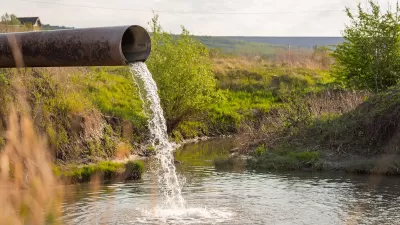This week, a bipartisan group of U.S. Senators introduced the Brownfields Utilization, Investment and Local Development Act of 2013 (BUILD Act), a bill aimed at assisting local communities in remediating and redeveloping contaminated sites.
With EPA estimates of more than 450,000 brownfield sites in the United States, the "[r]usted rail yards, old factories, shuttered gas stations, decaying warehouses and other brownfield sites blight neighborhoods in every city in the country." The past two decades have seen countless successful remediations and redevelopments of such sites, often in high-value and high-impact locations, thanks largely to the EPA's Brownfields Program.
According to a press release from the office of Senator Frank R. Lautenberg (D-NJ), one of the bill's sponsors, the aim of the BUILD Act is to "modernize and improve key elements of the Environmental Protection Agency's (EPA) Brownfields Program."
"The bill reauthorizes a wide array of financial and development tools for communities to help with site assessment and cleanup, all administered by the EPA’s Brownfields program," writes Craig Chester. "Among its provisions, the BUILD Act expands non-profit eligibility to receive brownfields grants and also allows the EPA to award flexible multipurpose grants to take into account the varied nature of many projects. More information about the specifics of the bill is available at Smart Growth America."
"Ultimately the BUILD Act could help communities across the country create the kind of development that’s an integral part of the country’s most vibrant places," he argues. "Brownfields represent tremendous economic development opportunities. The BUILD Act could help communities make it happen."
FULL STORY: How Congress Could Help Create the Next Great Neighborhood

Alabama: Trump Terminates Settlements for Black Communities Harmed By Raw Sewage
Trump deemed the landmark civil rights agreement “illegal DEI and environmental justice policy.”

Study: Maui’s Plan to Convert Vacation Rentals to Long-Term Housing Could Cause Nearly $1 Billion Economic Loss
The plan would reduce visitor accommodation by 25% resulting in 1,900 jobs lost.

Planetizen Federal Action Tracker
A weekly monitor of how Trump’s orders and actions are impacting planners and planning in America.

Wind Energy on the Rise Despite Federal Policy Reversal
The Trump administration is revoking federal support for renewable energy, but demand for new projects continues unabated.

Passengers Flock to Caltrain After Electrification
The new electric trains are running faster and more reliably, leading to strong ridership growth on the Bay Area rail system.

Texas Churches Rally Behind ‘Yes in God’s Back Yard’ Legislation
Religious leaders want the state to reduce zoning regulations to streamline leasing church-owned land to housing developers.
Urban Design for Planners 1: Software Tools
This six-course series explores essential urban design concepts using open source software and equips planners with the tools they need to participate fully in the urban design process.
Planning for Universal Design
Learn the tools for implementing Universal Design in planning regulations.
Caltrans
Smith Gee Studio
Institute for Housing and Urban Development Studies (IHS)
City of Grandview
Harvard GSD Executive Education
Toledo-Lucas County Plan Commissions
Salt Lake City
NYU Wagner Graduate School of Public Service





























